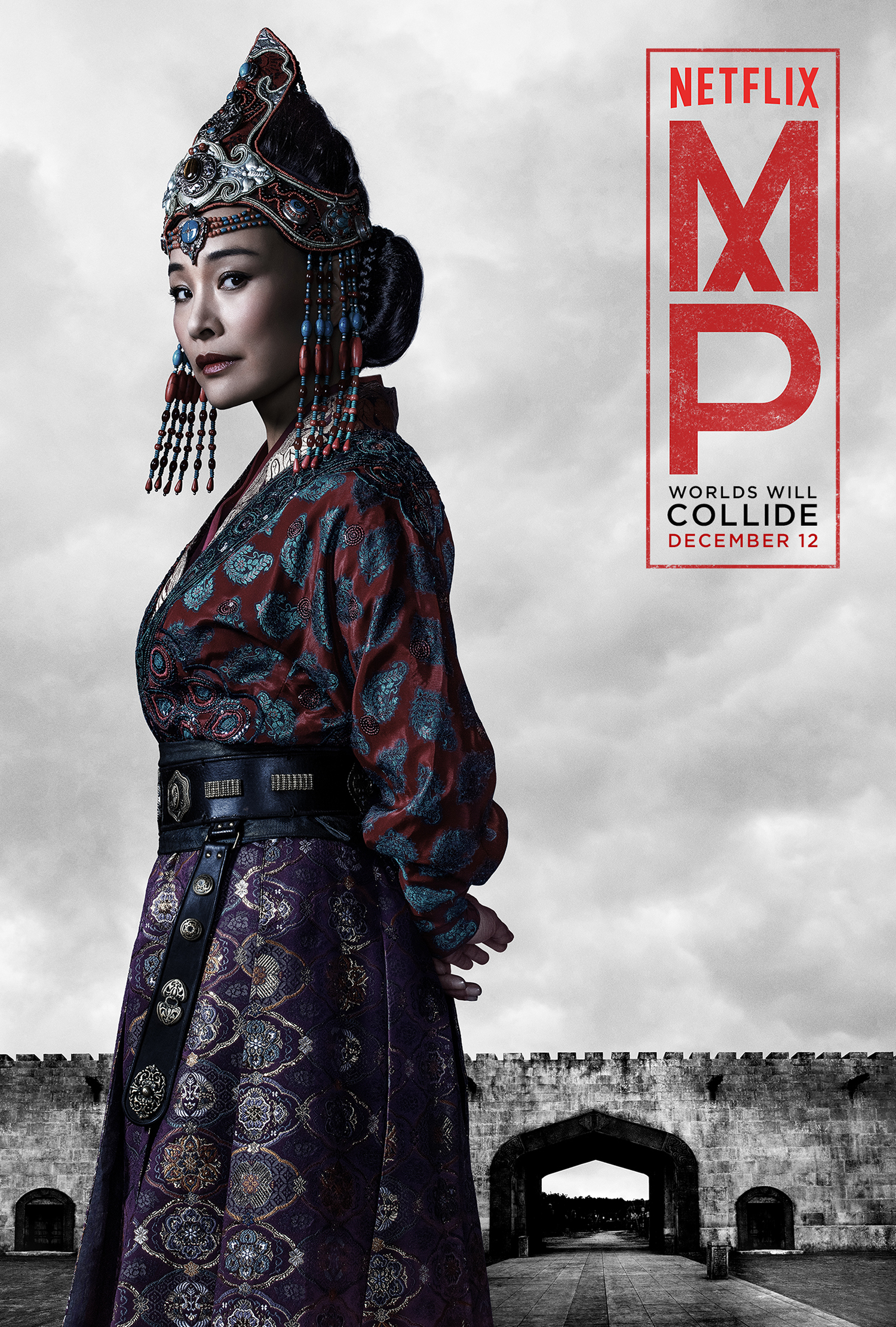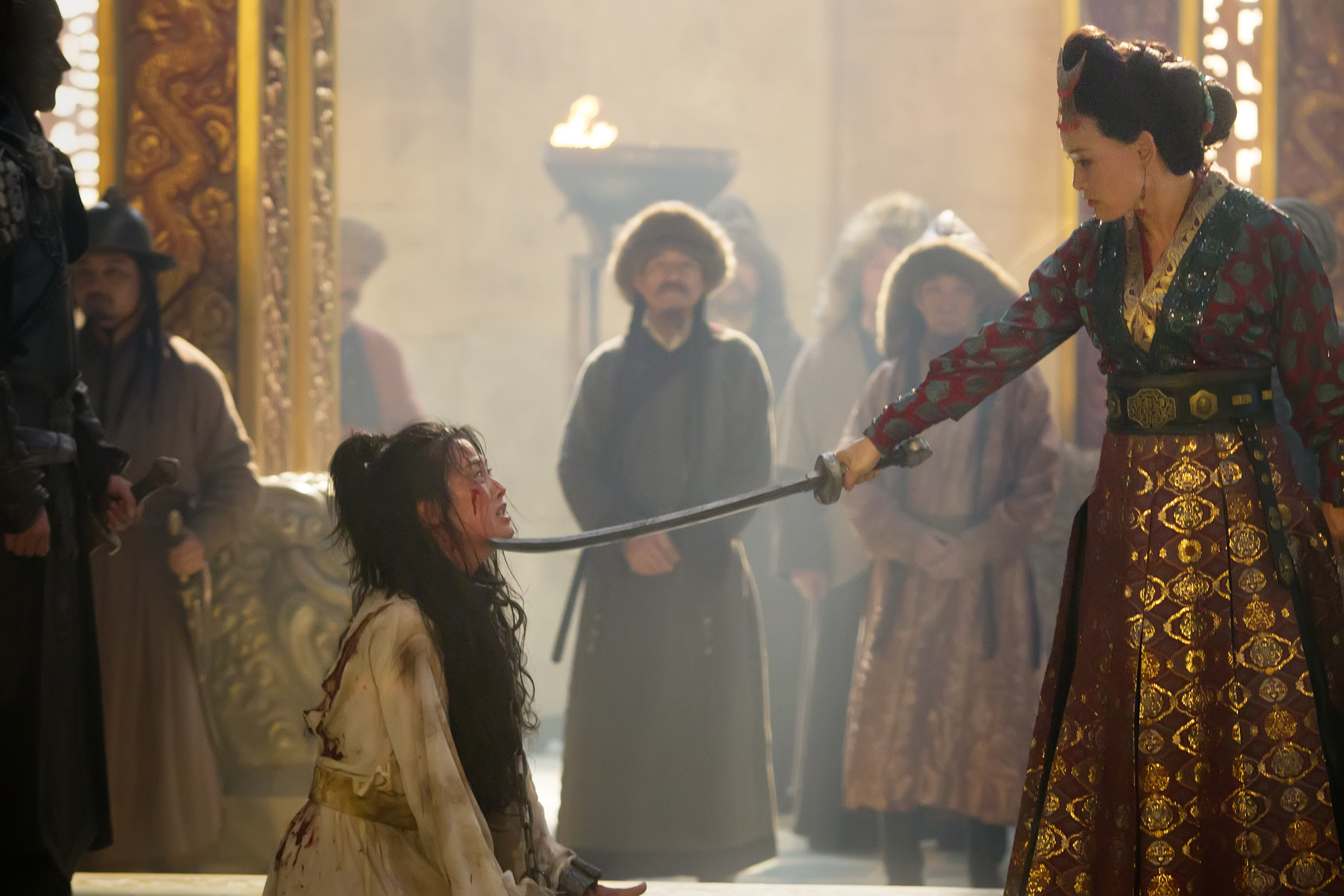Reader for more binge-watching? The new Netflix event Marco Polo debuts tomorrow! Here's Jose to talk to its glamorous stars...
The most surprising thing about Netflix's new series Marco Polo may be how much attention it gives to its non-titular female characters. Keep in mind, that the show takes place during the 13th century, an era in which women had little say in politics and were ignored by the history books filled as they are with male explorers and conquistadors, including the title character played by the gorgeous Lorenzo Richelmy. In a show which could have treated its women like decorative supporting objects, series creator John Fusco, the writers, and the actresses make them the most fascinating people we meet. As the boys plan wars, train in kung fu and engage in sword fights of all varieties, the women show their power through intellect.
 Two of the best characters in the show are Empress Chabi, played by international film and television goddess Joan Chen (Twin Peaks, Lust Caution), and Princess Kokochin, played by Zhu Zhu. Where the former is serene, to the point where her harshest decisions become chilling, the latter is more explosive.
Two of the best characters in the show are Empress Chabi, played by international film and television goddess Joan Chen (Twin Peaks, Lust Caution), and Princess Kokochin, played by Zhu Zhu. Where the former is serene, to the point where her harshest decisions become chilling, the latter is more explosive.
Other than its lead (Richelmy), who during the first season is mostly a vessel through which we see the clash of cultures, Marco Polo’s ensemble is completely non-white, something Chen highlighted during our conversation. In a time when Hollywood continues to practice whitewashing in casting, it's refreshing to see a show with people of so many different nationalities and races.
Chen and Zhu Zhu were gracious enough to discuss their process, their inspiration and the importance of history. Our talk is after the jump.
JOSE: Even though the show takes place during a time when the world was exclusively ruled by men, I found the women to be the most interesting characters because they remind me of Shakespearean characters. For example I’m always thinking about Lady Macbeth whenever I see Empress Chabi…
JOAN: You are? That’s great!
JOSE: Can you talk about how it was to play these women who are very strong and powerful, because of the way they use their intellect to manipulate the men who think they’re actually in charge?
JOAN: I think you said it very well. You answered this yourself. Yes, this was a world with very strong women. Historically and culturally the Mongol women were very strong, they contributed as much as the men to their society, their community. Other than upper body strength, I think they were equal to the men. To compensate for the lesser upper body strength they had to be smarter, they had to think more, they had to consider things more carefully.
ZHU ZHU: There’s a line my character says, “all Mongol women are born to the horse and the bow”, which showed that because they’re nomads they had to conquer nature as much as the men. So they’re stronger than other women in the region. At the same time our characters are very strong in their own unique ways. Chabi for example was one of the strongest women in Mongolia and Kokachin. my character, is tough because she has to survive in this world. She’s also vulnerable because she’s an idealist, so she struggles between the real world and her idealism.
I don’t want to seem shallow, but the costumes are fabulous, and I’m sure they played a huge part in helping you get into character, right?
ZHU ZHU: You’ve got good taste!
JOAN: That’s not shallow at all, because if you have the right costumes you feel more confident as the character, they really help you act. If the costumes are wrong, you feel awful in them and it lessens your acting.
 Joan Chen as Empress Chabi
Joan Chen as Empress Chabi
Period pieces always make me think of adults playing dress up, so growing up would you say this is the kind of job you dreamed of having?
JOAN: No (laughs)
ZHU ZHU: For me it was yes, every morning I got out of the shower, came to the set and it was only then that I started my real morning. While I went over my script they put the layers and layers of costumes on me, do my hair, makeup...this was the kind of morning these women went through every single day. Nowadays we brush our teeth, jump into the shower and run out, but this was very different, so it helps.
JOAN: Yes, I would say it’s like a meditative process, to have everything done for you every morning.
Joan, you give a beautiful performance in The Home Song Stories which I’m sure has served to inspired hundreds of actors, so I really wanted to ask who were some of your inspirations?
JOAN: In general, there are many actors who inspire me, but not particularly to play this part. For the part itself I found inspiration in history, in our own plot, in your partners, for example when I play a scene with Zhu Zhu I find my inspiration through our chemistry, as well as with Benny (Wong who plays her husband Kublai Khan). In my life I do look up to actors, at my age I ask myself, who else is playing interesting parts at my age which is very difficult for a female actor. On top of it, being a minority, having come from China makes it harder. When I look at films like Philomena and see Judi Dench, or for example someone like Helen Mirren, both of whom are older than me but are still doing fantastic work and playing all these great characters...Meryl Streep too of course. I look at them and think about my future, that when I’m 80 I’ll still have a part to play.
ZHU ZHU: I find inspiration in Joan. For this part it’s also important to consider that nothing like this show has ever been done before so it’s difficult to find role models for the role, which makes me feel lucky, because it gives me more space to be creative. It allows me to find inspiration from my past experiences.
 Lorenzo Richelmy and Zhu Zhu
Lorenzo Richelmy and Zhu Zhu
Since you brought up history, I like how the show creates a connection between these events and things that are relevant nowadays. Was the show’s importance from a historical perspective on the back of your mind as you prepared to play the part?
JOAN: We hope the show will inspire people to look into the history of China, nowadays I think this is more and more important for Americans, because these two countries need to understand each other. The show is not a history lesson, but it should inspire you to pay more attention to the historical context and keep that in mind as you communicate in the present.
ZHU ZHU: It’s important for people to try and be more like Marco Polo in how he explored the world, very few of us nowadays pay attention to cultures and try to understand them. We need to embrace the differences between our cultures and love them. Back then they thought Marco Polo was lying and had made everything up, because his stories challenged Europeans’ values, and he said “I haven’t even told half of what I’ve seen”. We need more people who love humanity and the world, people who want to understand each other.
JOSE: Joan, I really need to ask you, would cast and crew members come to you during breaks and tell you their crazy Twin Peaks theories?
JOAN: Sometimes! (Laughs) Especially now, since the new season is coming up soon.
Marco Polo will be available on Netflix on Friday December 12th.